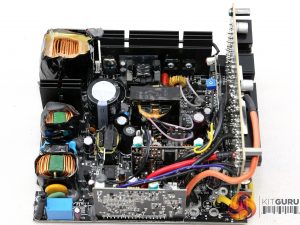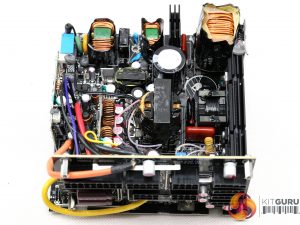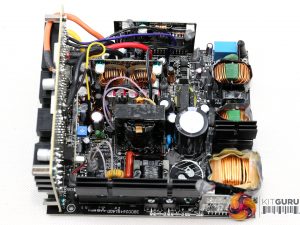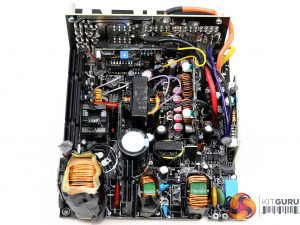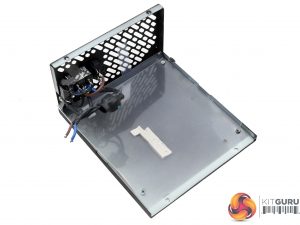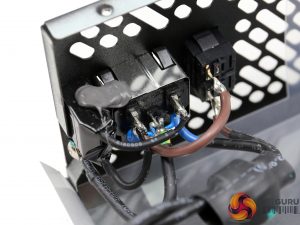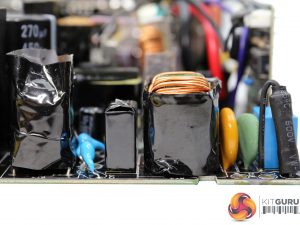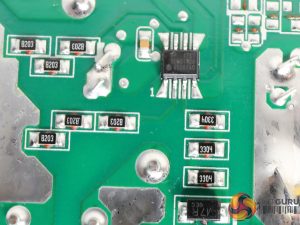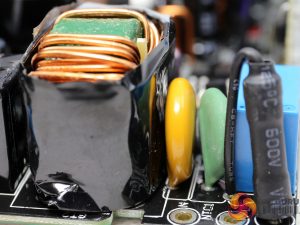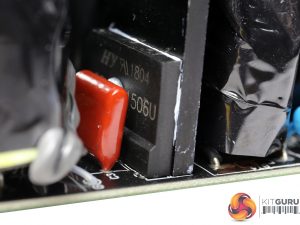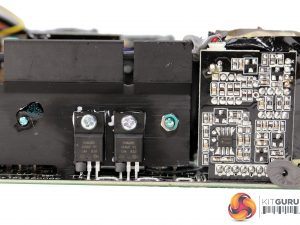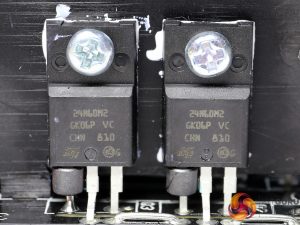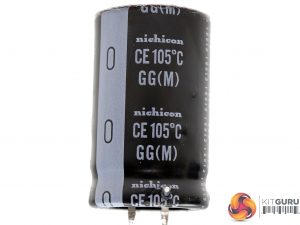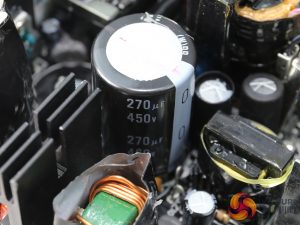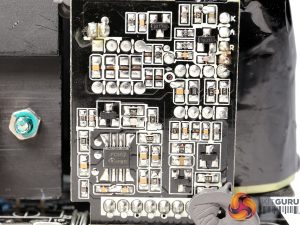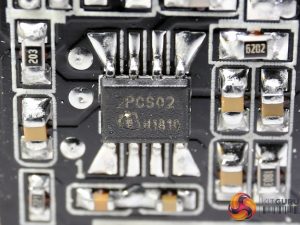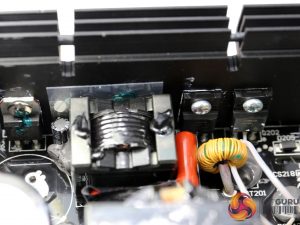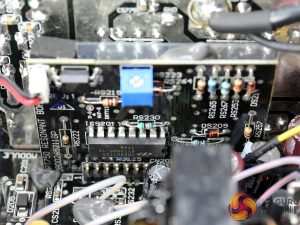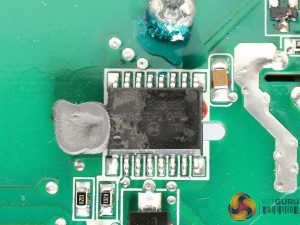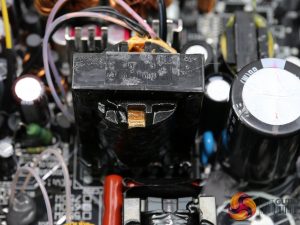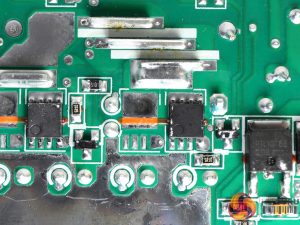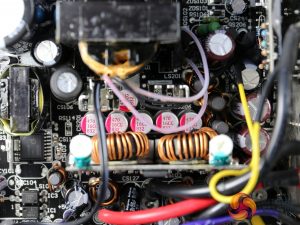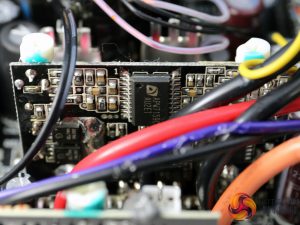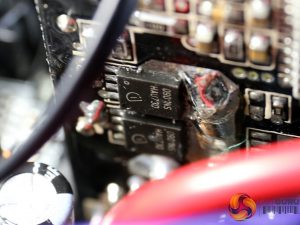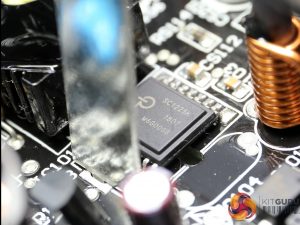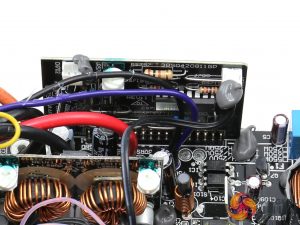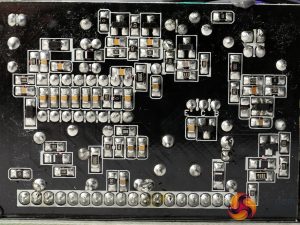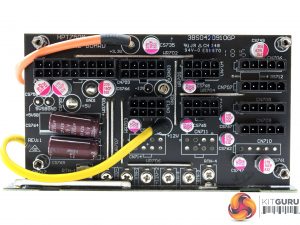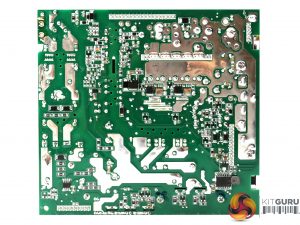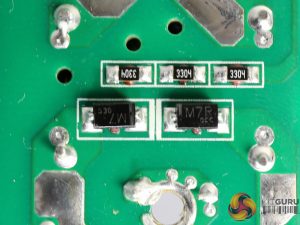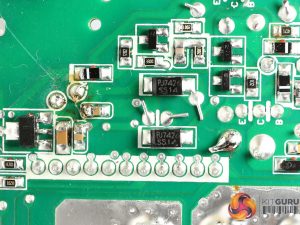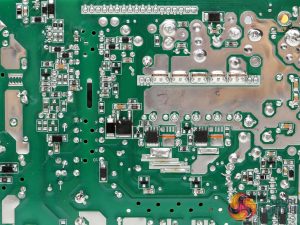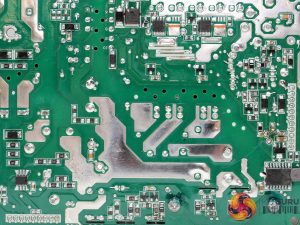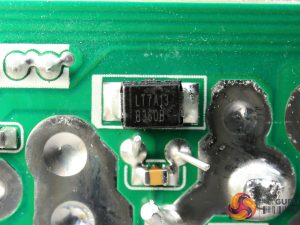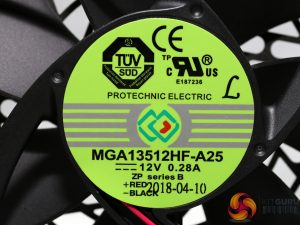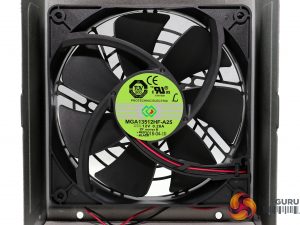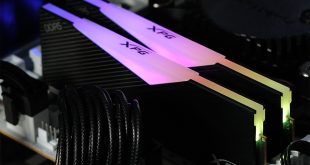|
General Data |
|
|
Manufacturer (OEM) |
FSP |
|
Platform Model |
PTM |
|
Primary Side |
|
|
Transient Filter |
4x Y caps, 2x X caps, 2x CM chokes, 1x MOV, 1x SEN013DG |
|
Inrush Protection |
NTC Thermistor & relay |
|
Bridge Rectifier(s) |
1x GBJ1506 (600V, 15A @ 100°C) |
|
APFC MOSFETS |
2x STMicroelectronics STFH24N60M2 (650V, 12A @ 100°C, 0.19Ohm) |
|
APFC Boost Diode |
1x STMicroelectronics STPSC6H065D (650V, 6A @ 110°C) |
|
Hold-up Cap(s) |
2x Nichicon GG (450V, 270uF each or 540uF combined, 2000h @ 105°C) |
|
Main Switchers |
2x STMicroelectronics STFH24N60M2 (650V, 12A @ 100°C, 0.19Ohm) |
|
Driver IC |
1x Silicon Labs Si8233BD |
|
APFC Controller |
|
|
Resonant Controller |
Champion CM6901T2X |
|
Topology |
Primary side: Half-Bridge & LLC Resonant Controller |
|
Secondary Side |
|
|
+12V MOSFETS |
2x Toshiba TPHR85 04PL (SOP Advance Series, 40V, 150A @ 25C, 0.85 mOhm) |
|
5V & 3.3V |
DC-DC Converters: 6x Infineon BSC0901NS (30V, 94A @ 100°C, 1.9mOhm) |
|
Filtering Capacitors |
Electrolytics: 6x KZE (1-5000h @ 105°C), Rubycon ZLH (6-10000h @ 105°C) |
|
Supervisor IC |
SITI PS223 (OCP, OTP, OVP, UVP, SCP, PG) |
|
Fan Model |
Protechnic Electric MGA13512HF-A25 (135mm, 12V, 0.28A, FDB) |
|
5VSB Circuit |
|
|
Rectifier |
International Rectifier IRFR1018E (60V, 56A @ 100°C, 8.4 mOhm) |
|
Standby PWM Controller |
Power Integrations SC1225K |
This is a modern platform however the design is not clean since a bunch of cables, instead of PCB traces, are used for power transfer – blocking this way, in a degree at least, the airflow.
We don't like seeing many cables inside contemporary designs and FSP should follow the lead of other OEMs who have found ways to minimize their use.
In the primary side a half-bridge topology is used along with an LLC resonant converter, while in the secondary side two FETs regulate the +12V rail and a couple of voltage regulation modules handle the minor rails.
The filtering caps are provided by both Japanese and Taiwanese manufacturers, while the fan is of very high quality.
As usual, the transient filter consists of two parts. It includes in total four Y and two X caps along with a pair of CM chokes, an MOV and a SEN013DG disconnect IC, which isolates not required circuits (e.g. the APFC converter) during standby, in order to restrict power consumption.
Right next to the MOV we find the NTC thermistor, responsible for protection against high inrush currents.
It is supported by a bypass relay, which makes sure that no energy is lost on the thermistor while the PSU is in operation. Moreover, this relay allows its fast cool down, enhancing the inrush current protection.
A single bridge rectifier (GBJ1506) is used. In high-end 650W units we usually find two of them, for increased amperage handling and mostly for lowering the power losses since they operate in parallel, so each one has to handle half the amperage.
The APFC converter uses two STMicroelectronics STFH24N60M2 FETs and a single STPSC6H065D boost diode, provided by the same manufacturer. Two Nichicon GG bulk caps are installed, with 540uF combined capacity which is not enough to provide a longer than 17ms hold-up time.
The APFC controller is a Infineon ICE2PCS02, which looks to be supported by a Fairchild KA393 differential comparator.
The platform's main switching FETs are a couple of STMicroelectronics STFH24N60M2, arranged into a half-bridge topology. An LLC resonant converter is providing an efficiency boost; its controller is the usual aspect, a Champion CM6901T2X. Finally, the driver IC supporting both main FETs is provided by Silicon Labs (Si8233BD).
The main transformer.
A couple of Toshiba TPHR85 04PL FETs regulate the +12V rail. They are installed on the solder side of the PCB, while two small heatsinks right above them assist in their cooling.
The electrolytic filtering caps in the secondary side are provided by Chemi-Con and Rubycon. We also find a number of Teapo polymer caps.
The voltage regulation modules that generate the minor rails use in total six Infineon BSC0901NS FETs, while the common PWM controller is an Anpec APW7159C.
The controller of the highly efficient 5VSB circuit is a Power Integrations SC1225K IC. An International Rectifier IRFR1018E FET is also used.
The supervisor IC is a SITI PS223, which is among the very few supporting over temperature protection out of the box.
At the face of the modular board we meet a couple of KZE caps along with several Teapo polymers. Although this board is connected to the main one through bus bars, still FSP uses two thick wires to transfer a part of the +12V rail along with the 3.3V one. The use of power transfer wires is not a good practice though since it affects airflow and on top of that those cables, in the majority of cases cause higher voltage drops compared to other means of power transfer (e.g. thick PCB traces and bus bars).
The soldering quality is not the best we have seen from FSP; in some areas we notice sloppy solders and to make matters worse, we also find some pretty long component leads, which we hate to see since they are a sign of inferior quality control.
You can never go wrong with a Protechnic Electric fan, since they are of high quality. The fan's model number is MGA13512HF-A25 and it uses a fluid dynamic bearing which will last for long.
 KitGuru KitGuru.net – Tech News | Hardware News | Hardware Reviews | IOS | Mobile | Gaming | Graphics Cards
KitGuru KitGuru.net – Tech News | Hardware News | Hardware Reviews | IOS | Mobile | Gaming | Graphics Cards


